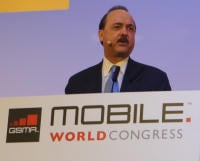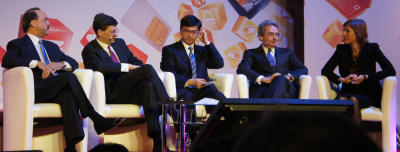This article is more than 1 year old
Mobile net kingpins v the world: 'Why should we pay the 4G tab?'
The data crunch is coming – and Apple makes the crunchiest phones
It's all about the spectrum...

Ralph de la Vega was the man who
bought an iPhone from Steve Jobs
Ralph de la Vega, president & CEO Mobility & Consumer Markets for AT&T, was the last speaker, and probably the most upbeat of the lot.
“Spectrum is the lifeblood of the industry,” he said. He described a virtuous circle that “leads to something wonderful”: networks are built, services are developed and jobs are created, then apps and content are produced and this creates more demand so you need more spectrum.
He said that over the last couple of years there had been a customer shift in how technology is perceived – from data overload (“It’s going to take over my life”) to positivity ("It makes my life richer”) – and that this is reflected in usage patterns.
He said AT&T had coined marketing terms for everyday tech use, including "digital intimacy" (sharing data), "digital kinship" (making calls and sending texts), "digital guardianship" (grandparents video-calling grandchildren, for eg) and "digital heroism" – remotely connecting burglar alarms and doing price comparison on your phone while out shopping.
Like the other speakers, he sees massive demand for data and also quoted the Cisco figures which predict an eighteen-fold growth in the next four years, adding that two-thirds of this will be video traffic. De la Vega challenged the industry to make it as easy to place a video call as a voice or data call. He wants to see this falling into place with standards, particularly IR.94.
Machine-to-machine will be big, he added. He said it was endlessly useful, providing metrics on water use to farmers, for example, “connecting dirt to the internet", helping them to "look at an open field and see revenue.” He said the use of M2M could help realise the "value of trash", as a rubbish company could use connected dumpsters to save time by only collecting them when they were full.

These people run the networks that account for over half the world's mobile customers
All of the speakers agreed that there was a need for more spectrum at reasonable prices, because it was the over-the-top players who were making all the money while the operators had to put in the expensive infrastructure – and that a revisiting of the business model was necessary.
De la Vega just happens to be the guy who bought an iPhone from Steve Jobs, personally, not though sales and purchasing staff, and who created the model where the biggest OTT company in the world was allowed to put misbehaving phones on its network. ®
